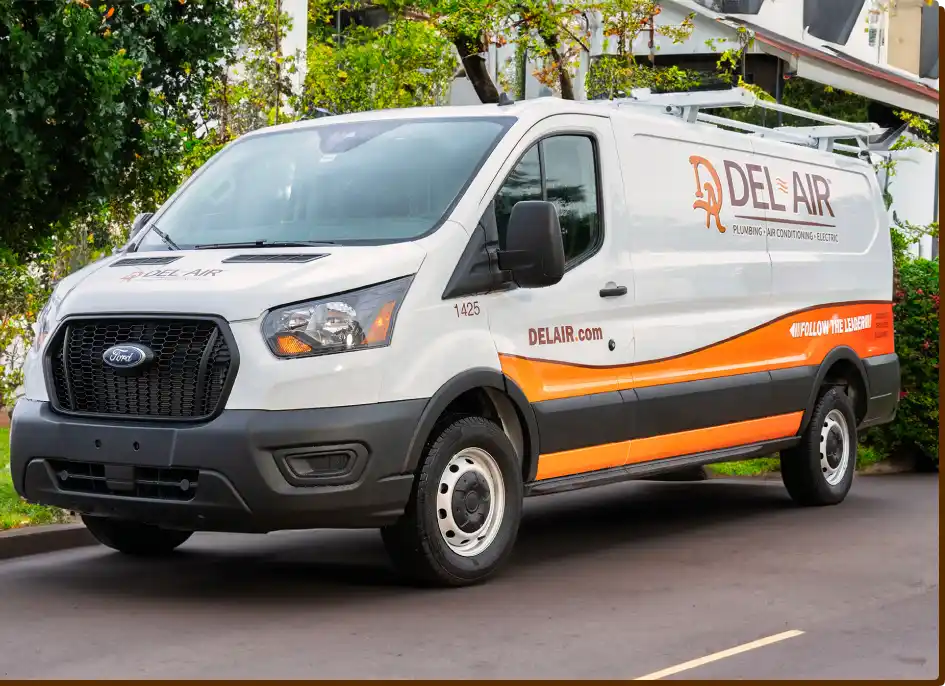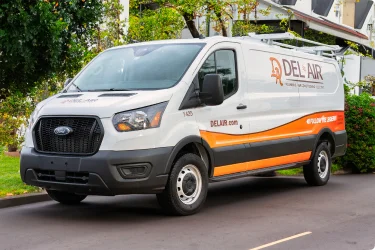When it comes to your home’s heating, cooling, plumbing, and electrical needs, we understand that you may have questions — and our team is prepared to provide the answers you seek.
The knowledgeable technicians at Del-Air Plumbing, Air Conditioning, Electric have taken the time to answer some of the most frequently asked questions we receive below. If you don’t see the answer to your specific question listed, however, we encourage you to reach out to our team to get the answers you seek.
Contact our team online to speak with our home service professionals and get the answers to all your HVAC, plumbing, and electrical questions.
General FAQs
Do You Service all of Tampa?
Yes. We’re proud to provide service throughout Tampa and the surrounding region, including in Hernando County, Hillsborough County, Pasco County, and Pinellas County.
Do you offer emergency services?
Our team understands that emergencies can strike at any time, which is why we proudly offer 24/7 same-day service solutions to address all of your urgent repair requests quickly.
What is your maintenance plan?
We offer maintenance agreements to help make keeping up with your continued service needs easy and affordable. Through our maintenance plan, you’ll enjoy two scheduled HVAC visits annually, one on-demand plumbing and electrical visit, 15% off repair services, $500 off HVAC installations, and much more.
Do you offer any discounts or coupons?
Our commitment to delivering cost-effective service is reflected in our rotating service specials. From free HVAC, plumbing, and electric inspection promotions for hurricane-affected homeowners to $100 off AC tune-ups, we regularly offer updated discounts to help Tampa families save on service.
Do you offer free estimates?
Yes, we help homeowners make the most informed decisions on all their service needs by providing free estimates on all HVAC, plumbing, and electrical replacement quotes.
HVAC FAQs
How do I know if I need repair or replacement?
In general, HVAC repairs are recommended for newer systems suffering minor issues; however, if your unit is older than 10 years old, needs frequent, expensive repairs, or the cost to repair your system exceeds half that of a full replacement, an upgrade may be the more cost-effective option.
How do I tell what type of HVAC system my home has?
To determine the type of HVAC system in your home, check the unit label or manuals for details on whether you have a central air system, heat pump, ductless mini-split, or furnace. You can also check the equipment. Central systems usually have outdoor and indoor units connected via ductwork, while ductless systems have individual wall-mounted units.
Should I install a heat pump?
With Tampa’s long, hot summers and mild winters, a heat pump system can be a great way to achieve year-round comfort in your home while reducing your monthly heating and cooling costs.
How do I change an air filter?
To change an air filter, turn off your HVAC system, locate the filter compartment (typically near the return air duct or blower), remove the old filter, and insert a new one matching the correct size and airflow direction indicated on the filter. Finally, close the compartment and restart the system.
How often should I service my HVAC system?
Since Tampa residents typically rely on their air conditioners year-round, it’s recommended to have your air conditioner serviced at least twice annually: once at the end of winter or early spring, and once at the end of summer or early autumn.
Plumbing FAQs
Why is there no water in my house?
Disruptions to your water supply are typically caused by either a main line break, closed shut-off valve, or plumbing issue such as a burst pipe. Check with your water provider and inspect your home for any visible leaks.
How long do water heaters last?
Standard tank water heaters typically last 8 to 12 years with routine maintenance, while tankless water heater systems can last up to 20 years or longer with annual tune-ups.
What causes clogged drains?
The most common culprits behind stubborn drain clogs are hair, grease and oil solidifying inside pipes, foreign objects being flushed down the drain (such as paper products, feminine hygiene products, baby wipes, or toys), and pipe deterioration.
How do I unclog a kitchen sink?
You can unclog a kitchen sink by using a plunger, pouring boiling water or a mixture of baking soda and vinegar down the drain, or using a drain snake if needed. If the clog persists, it may be necessary to contact a plumber.
What should I do if I have a leaking faucet?
Turn off the water supply to the faucet and either replace the worn-out washer, O-ring, or cartridge. Contact a plumber if you’re unsure of the cause or repair steps.
Electrical FAQs
Can I fix my home’s electrical issue myself?
While it’s possible to fix minor electrical issues such as tripped circuit breakers on your own, anything involving wiring, outlets, installations, or major repair work should be trusted to a licensed electrician. Without the proper tools or training, attempting to service your electrical system could result in further equipment damage, electrical fire, electrocution, or significant personal injury.
Should i install a surge protector in my Florida home?
Given the number of hurricanes and thunderstorms experienced in the area, installing a surge protector in your Florida home is a wise investment. Surge protectors can help protect your electrical devices from damage caused by power fluctuations due to severe storm activity.
Do I need to upgrade my home’s wiring?
You should consider upgrading your home’s wiring if it’s older than 30 years old, you’re planning a remodel, or you’re adding new appliances or fixtures that draw a large amount of energy.
When do I need an electrical inspection?
Electrical inspections should be conducted at least once every 3 to 5 years and any time you’re buying or selling property or making significant changes to your home’s layout or electrical load.
Do I need an electrician to install a new light?
Yes. Lighting installations involve wiring, and without the proper tools or training, attempting such projects on your own can be dangerous.



